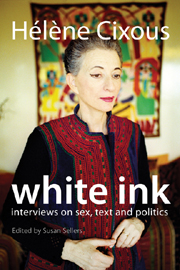Book contents
- Frontmatter
- Contents
- Acknowledgements
- Editor's note
- Preface: On being interviewed
- Part I Writing the enigma
- Part II Writing the feminine
- Part III Writing and politics
- Part IV Writing and theatre
- Part V Writing roots
- Part VI On painting, music and nature
- 12 You race towards that secret, which escapes
- 13 We must hand our inheritance on
- Part VII Dialogues
- Envoi: But the Earth still turns, and not as badly as all that
- Bibliography of Hélène Cixous's works
- Index
12 - You race towards that secret, which escapes
from Part VI - On painting, music and nature
- Frontmatter
- Contents
- Acknowledgements
- Editor's note
- Preface: On being interviewed
- Part I Writing the enigma
- Part II Writing the feminine
- Part III Writing and politics
- Part IV Writing and theatre
- Part V Writing roots
- Part VI On painting, music and nature
- 12 You race towards that secret, which escapes
- 13 We must hand our inheritance on
- Part VII Dialogues
- Envoi: But the Earth still turns, and not as badly as all that
- Bibliography of Hélène Cixous's works
- Index
Summary
This extract is taken from a much longer public interview with Martin McQuillan at the University of St Andrews on 24 June 1999. The interview was conducted in English and was published as “ ‘You race towards that secret, which escapes’: An interview with Hélène Cixous”, in The Oxford Literary Review, “Reading Cixous Writing” 24, 185–201, 2002. After questions from Martin McQuillan the interview was opened up to include the audience, and it is a member of the audience who asks the questions in this extract.
question I am struggling with the relationship between painting and writing, I would like to ask something about that area, which might lead back to why Hélène Cixous thinks that perhaps writing is more important than painting? And I think that in one piece of her writing, she says that painting is more sensuous and immediate than writing, but there is a lovely bit where she says that when offered an apple or an orange (that was painted), she would like to eat it. In a sense writing can eat the apple. So, I would like to know about that, and the last point of the question is whether painting has more space for women to transform and transgress than writing does, or whether it is the other way around?
cixous Well, thank you. These are huge questions — and beautiful questions.
You know when we started, I should have said one thing regarding “Cixous”, which is something very difficult to say, because I think that while one should read, unfortunately one should in the original, but it is not given to us.
- Type
- Chapter
- Information
- White InkInterviews on Sex, Text and Politics, pp. 145 - 147Publisher: Acumen PublishingPrint publication year: 2008



